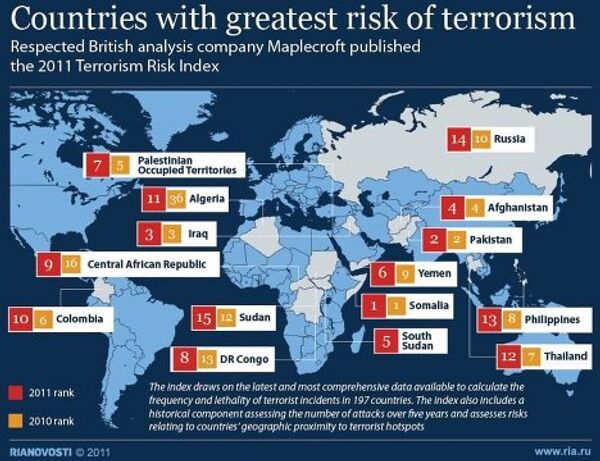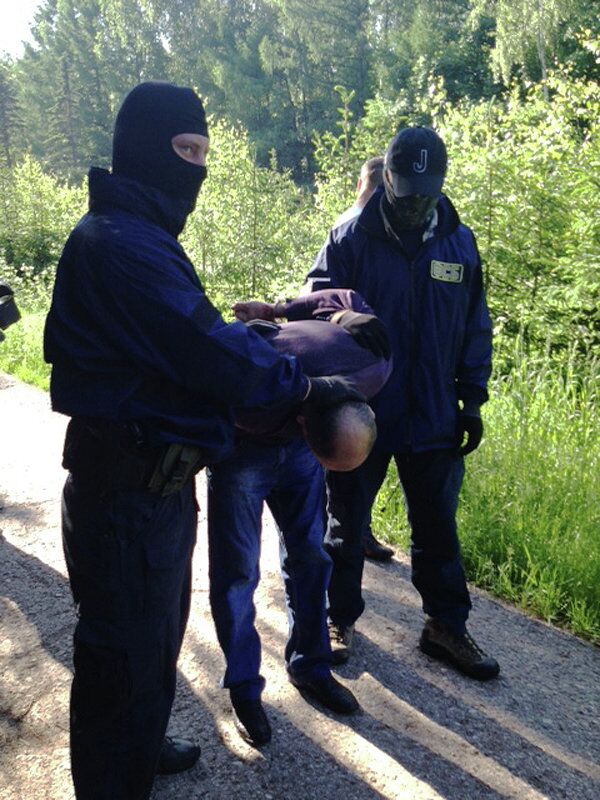MOSCOW, June 6 (RIA Novosti) – Russia’s security services have shut down a terrorist group, members of which were active in Afghanistan against NATO coalition forces, a statement issued by Russia’s National Antiterrorism Committee (NAK) on Thursday said.
The NAK statement said a “particularly dangerous” group was planning terror attacks in Moscow around the time of the Victory Day Celebrations in early May.
The statement explains that Thursday’s detention of Yulai Davletbaev,43, concluded an operation that culminated in a shoot-out in an apartment building outside Moscow on May 20, which saw two suspected terrorists killed and one detained.
NAK says that the man detained in the earlier phase of the operation shared information regarding Davletbaev.
Russian media outlets had previously reported that Davletbaev was one of those killed in the May operation.
NAK claims the suspects were actively involved with the Islamic Party of Turkestan, a recognized radical group, and that they had traveled to the Afghanistan-Pakistan border region in 2010 for ideological and combat training, including in the use of explosives. In its statement, NAK particularly highlights the claim that members of this group had taken part in attacks on NATO and allied forces in Afghanistan.
Identifying Davletbaev as from Russia’s mainly Muslim region of Bashkortorstan, NAK claims he was the chief planner of the thwarted terror attacks in Moscow.
He had worked as an unlicensed taxi driver in Moscow so he could travel across the city identifying targets that would deliver the greatest damage without attracting the law enforcement agencies’ attention, the NAK statement says.
There have been several confirmed cases of people from Russia’s largely Muslim republics traveling to, and fighting in, Afghanistan.
One such case involves Shamil Khazhiyev, who – like Davletbayev – is from the Volga region Bashkortostan. Khazhiyev was seized by US troops in Afghanistan and held in the United States’ Guantanamo Bay military prison from 2002 to 2004, when he was returned to Russia to serve the remainder of his sentence.
“There have been small groups of militants from Bashkortorstan and Tatarstan for some time making their way to Afghanistan and Pakistan. This is not staggering news: that we have people from Bashkortorstan traveling there, training, being radicalized, taking part in attacks,” Professor Anatol Lieven, from Kings’s College London War Studies Department told RIA Novosti on Thursday.
This is a phenomenon that Lieven says is well substantiated by sources in NATO, Afghanistan, and Pakistan. “There are also Arab militants who are known to have fought in the Caucasus who previously fought in Afghanistan,” Lieven said.
The volatile Caucasus region has been plagued by an Islamic insurgency since the first and second Chechen wars.
“The ultimate nightmare for the Russian state is the threat of serious Islamist militancy from the Caucasus spreading to the Volga,” Lieven added. However, although the potential threat from these areas is infinitely greater than that from the Russian Caucasus, Lieven says that Russia’s sensitive handling of the region has ensured that it remains largely contained.
The NAK statement mentions that the FSB has linked Davletbaev to other terror suspects, including Nafis Shaimukhametov, who was killed by the security services in August 2010 after reportedly organizing attacks on Russia Day (June 12) in the Perm Region, killing one policeman. Russia’s security services also say Shaimukhametov was involved in planting explosives along one of Russia’s key gas supply pipelines to Europe.
On Wednesday, Alexander Bortnikov, the head of Russia’s Security Service, the FSB, named the Islamic Party of Turkestan as one of the most dangerous terrorist groups active today, alongside the Taliban and Islamic Jihad.
Some security agencies recognize the Islamic Party of Turkestan as being closely connected to the Islamic Movement of Uzbekistan and al-Qaida.
The United States designated the IMU a Foreign Terrorist Organization in 2000, and it was banned in Russia in 2003. It is also outlawed in countries across Central Asia, and as far afield as Australia. The IMU has been active in Afghanistan, attacking international and Afghan forces, and parts of Pakistan for a number of years.
Andrei Soldatov of the Agentura think tank, who specializes in analyzing the work of Russia’s security services, notes that although it is well known that people from Russia travel to Central Asia, Afghanistan and Pakistan, there are not many cases where they have returned to carry out attacks in central Russia.
“This could represent a new development in terrorism here,” Soldatov said.
Soldatov also notes that this year has seen a series of operations by the FSB targeting Central Asian groups, in which “most of those initially detained were later released, which does not suggest there was evidence they were planning attacks,” he said.
This, Soldatov suggests, makes the emphasis on this connection between the domestic terror threat in Russia and recognized international terrorist groups look somewhat politically motivated.
“After the Boston bombings, they are all talking about cooperation in terrorism, and they want to give more of a boost to those people who say we are all fighting the same enemy, we are all targeted by the same groups” Soldatov said. “It looks like they want to impress the Americans, something similar happened after 9-11.”
There have been a series of high-level bilateral talks between Russia and America in recent weeks, in which officials, including presidents Barack Obama and Vladimir Putin, pledged increased cooperation in counterterrorism.
Recast throughout with increased emphasis on international line, greater detail, expert opinion, and new head.



